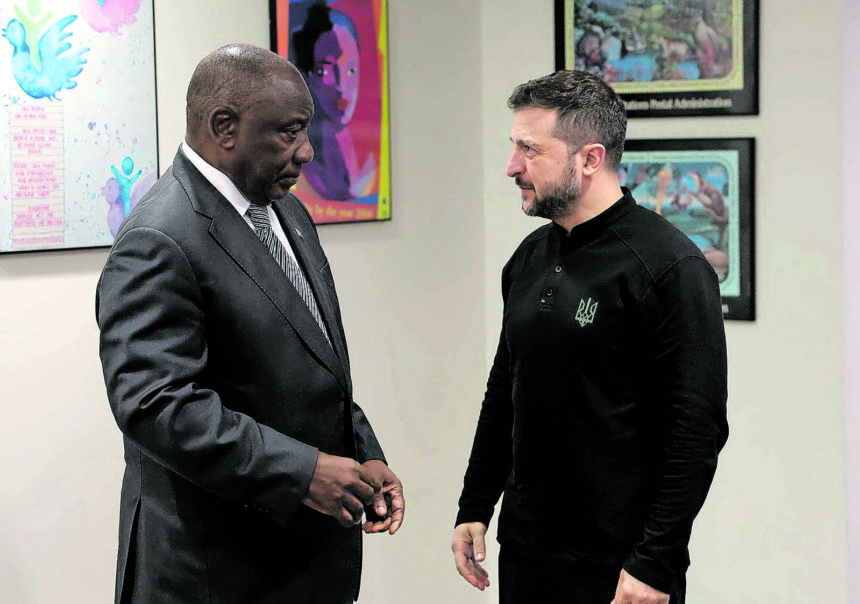President Cyril Ramaphosa of South Africa has extended a formal invitation to President Volodymyr Zelenskiy of Ukraine for a state visit, with hopes that it will take place soon. The invitation was issued on January 15th, following meetings between the two leaders at the United Nations General Assembly in New York and the World Economic Forum meeting in Davos. Although no specific date has been set, Ramaphosa has instructed diplomats to prioritize preparations for the visit.
The invitation comes at a crucial time as the United States has begun peace talks with Russia regarding the conflict in Ukraine. President Donald Trump’s recent statements indicating a potential shift in US support for Ukraine have raised concerns in Europe and Ukraine. Zelenskiy’s requests for a meeting with Trump prior to talks with Russian President Vladimir Putin were rejected, leading to fears that the US may favor a peace agreement that benefits Russia.
In response to Trump’s remarks, Zelenskiy expressed the need for more transparency and truth in negotiations. Trump’s characterization of Zelenskiy as a dictator and threats towards Ukraine have further strained diplomatic relations. Ramaphosa’s spokesperson emphasized the importance of including all parties in peace negotiations and not dictating terms to conflicting parties.
As South Africa prepares to host a meeting of foreign ministers from G20 nations in Johannesburg, the rift between the US and Ukraine continues to escalate. US Secretary of State Marco Rubio’s decision to skip the meeting underscores the ongoing diplomatic tensions. Russian Foreign Minister Sergey Lavrov is expected to attend the meeting, and Ramaphosa is anticipating a courtesy call from him to discuss the recent talks in Riyadh.
The exclusion of European leaders from peace negotiations between the US, Russia, and Ukraine has prompted concerns about the lack of representation at the negotiating table. Ramaphosa emphasized the need for all interested parties, including Europe, to have a voice in the peace process. As South Africa navigates its role in facilitating negotiations between Moscow and Kyiv, the focus remains on ensuring an inclusive and equitable resolution to the conflict. Foreign diplomats in South Africa are anticipating discussions around the US initiative on the war in Ukraine during the upcoming G20 meeting. This event provides an opportunity for South Africa, as the current holder of the G20 presidency, to strengthen consensus on an agenda focused on equitable development and sustainability. This agenda has been criticized by US Senator Marco Rubio as evidence of South Africa’s “anti-Americanism.” Nevertheless, European diplomats have voiced their support for South Africa’s leadership in the economic cooperation forum.
European Commission president Antonio Costa emphasized the EU’s commitment to enhancing relations with South Africa, citing the country as a “reliable and predictable” partner. Despite the recent suspension of all donor funding to South Africa by former President Trump, government officials have stated that they will not seek isolation from the US. However, the rhetoric used by US Deputy President JD Vance and commentator Pete Hegseth may impact South Africa’s efforts to align with its European allies.
During the Munich Security Conference, Vance’s comments urging European leaders to engage with far-right parties, such as Germany’s Alternative for Germany (AfD), drew criticism from German Chancellor Olaf Scholz. Scholz emphasized that Germany would not tolerate directives on its democratic processes or support for a party that downplays Nazi atrocities. The commitment to “never again” is incompatible with backing the AfD, Scholz affirmed.
In his presidential order cutting off aid to South Africa, Trump reiterated his backing for Afrikaners, a white minority group allegedly facing racial persecution in the post-apartheid era. This stance has further strained relations between the US and South Africa, complicating efforts to find common ground on international issues.
As South Africa navigates its G20 presidency and seeks to foster partnerships with European nations, the dynamics between the US, Europe, and South Africa will continue to shape global diplomatic discourse. The country’s commitment to promoting equitable development and sustainability, despite differing views from key stakeholders, underscores its role as a pivotal player in international relations.







